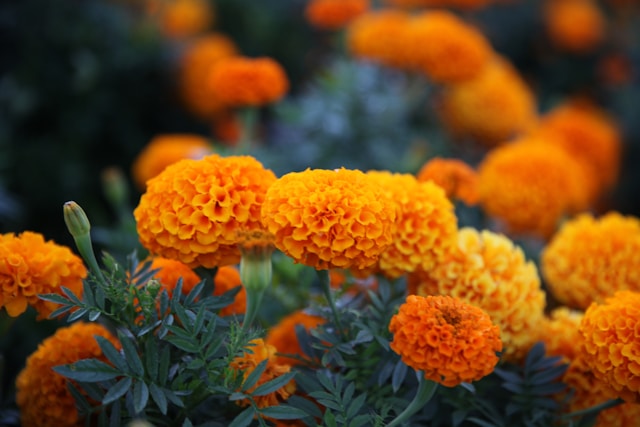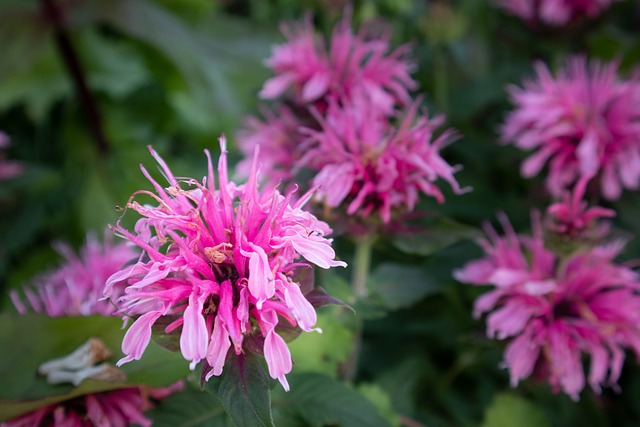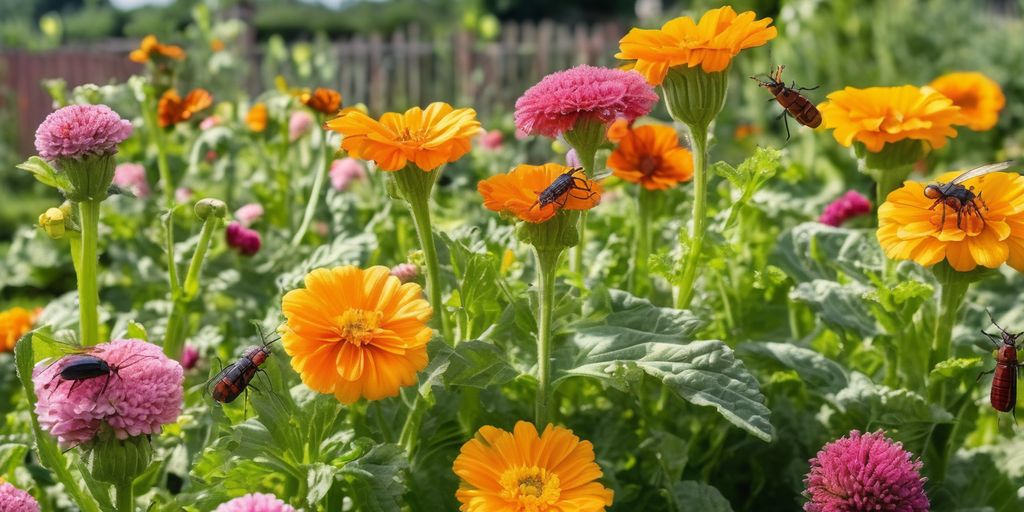If you’re looking for a natural way to keep insects away from your vegetable garden, try planting flowers! Studies have shown that planting certain kinds of plants near other plants – or companion planting – can help keep unwanted pests away from your garden without the need for chemicals.
In fact, some of our favorite flowers repel insects through fragrance, oils, or even colors. below are the best flowers for a vegetable garden that deter pests!
Key Takeaways
- Marigolds are great for repelling nematodes and other soil-borne pests.
- Nasturtiums act as a trap crop for aphids, protecting nearby vegetables.
- Lavender and chives use their strong scents to deter a variety of pests.
- Sunflowers and petunias draw aphids and other pests away from sensitive crops.
- Basil not only repels several insects but also enhances the flavor of nearby vegetables.
1. Marigolds

Marigolds are a gardener’s best friend when it comes to maintaining a healthy and vibrant vegetable garden. These bright, cheerful flowers are not only aesthetically pleasing but also serve a crucial role in natural pest control. Particularly effective against nematodes and harmful insects, marigolds help in keeping the garden free from pests that could damage crops.
Benefits of Marigolds in the Garden
- Repel pests: Especially effective against Mexican bean beetles and nematodes.
- Attract beneficial insects: Such as ladybugs and lacewings, which help control aphid populations.
- Enhance pollination: Their presence boosts the activity of pollinators.
- Aesthetic appeal: Adds color and diversity to garden layouts.
- Improve plant health: Contributes to the growth and resilience of nearby plants.
Remember to deadhead marigolds regularly to encourage continuous blooming and give them a sunny spot for optimal growth. The flowers are also edible, adding a citrusy tang to salads or as a garnish.
2. Nasturtiums
Nasturtiums are a vibrant and versatile addition to any vegetable garden, known for their ability to attract beneficial insects while deterring pests. These plants are particularly effective as a trap crop for aphids and squash bugs, making them an excellent choice for companion planting with vegetables like beans, broccoli, and cucumbers.
Planting and Care
- Sow nasturtium seeds in plug trays but wait to plant them outdoors until the risk of frost has passed.
- Space the plants about 10 to 12 inches apart to allow for adequate spreading.
- Water moderately and avoid overwatering to prevent root rot.
- Avoid regular fertilization as excessive nutrients can promote foliage over flower growth.
Nasturtiums not only contribute to a healthier environment for neighboring plants but also enhance the garden’s biodiversity by attracting pollinators such as bees and butterflies. Additionally, every part of the nasturtium—from the leaves to the flowers—is edible, adding a spicy, peppery flavor to dishes.
3. Lavender

Lavender is not only celebrated for its delightful fragrance and aesthetic appeal but also for its effectiveness in repelling common garden pests like moths, deer, and rabbits. This makes it an excellent addition to any vegetable garden seeking natural pest control solutions. Lavender’s strong scent, which includes camphor, acts as a deterrent to many pests, including flies, fleas, and mosquitos.
Lavender can be planted alongside roses and herbs like rosemary to enhance its pest-repelling qualities, although it should not be planted near mint or impatiens due to compatibility issues.
Additionally, lavender attracts beneficial pollinators such as bees and butterflies, which are essential for the pollination of nearby vegetable crops. This dual role of both attracting beneficial insects and repelling harmful ones makes lavender a valuable plant in the sustainable management of a vegetable garden.
4. Chives
Chives are a versatile herb that not only enhances the flavor of dishes but also plays a crucial role in companion planting for Brussels sprouts and other members of the cabbage family. Their ability to deter pests such as Japanese beetles and carrot rust flies makes them an invaluable addition to any vegetable garden. Additionally, chives help prevent apple scab and are effective against aphids.
- Pest Deterrence: Chives are known to repel deer and various insects, contributing to a healthier garden environment.
- Pollinator Attraction: They attract beneficial pollinators, which are essential for the pollination of many garden plants.
- Perennial Growth: Chives come back year after year, making them a cost-effective choice for gardeners.
Chives spread out but are manageable compared to other herbs, making them easy to incorporate into garden spaces without the fear of them taking over.
5. Sunflowers
Sunflowers, with their iconic large yellow heads, are not only a visual delight in a vegetable garden but also serve multiple functional roles. Their ability to attract a variety of beneficial insects such as bees, bumblebees, lacewings, and ladybirds makes them an excellent choice for companion planting. However, it’s noteworthy that sunflowers are not particularly attractive to hoverflies.
Benefits:
- Attracts essential pollinators enhancing the pollination of nearby vegetable crops.
- Acts as natural trellises for climbing plants like beans and cucumbers, optimizing garden space.
Planting Tips:
- Ensure full sun exposure, requiring at least 6-8 hours of direct sunlight daily.
- Prefer well-drained, nutrient-rich soil; enriching with compost can boost growth.
- Space sunflowers 12 to 24 inches apart, accommodating their size and deep root system.
Sunflowers not only beautify your garden but also play a crucial role in the ecosystem of your vegetable garden, promoting garden health and yield.
6. Bee Balm

Bee Balm, also known as Monarda, is a fantastic addition to any vegetable garden, particularly when companion planting with eggplants. This plant not only enhances the garden’s aesthetic with its vibrant flowers but also plays a crucial role in repelling pests and attracting beneficial pollinators like bees and butterflies.
- Repels pests: Bee Balm is known for its ability to deter various garden pests, which helps in maintaining the health of nearby plants.
- Attracts pollinators: The bright and aromatic flowers of Bee Balm attract bees and butterflies, which are essential for pollination.
- Enhances garden productivity: By improving the overall health and fertility of the garden, Bee Balm supports the growth of surrounding vegetable plants.
Bee Balm is not only beneficial for its pest-repelling qualities but also enhances the overall biodiversity and beauty of the garden.
7. Basil

Basil is not only a staple in culinary dishes, particularly Italian cuisine, but it also plays a crucial role in the garden as a pest deterrent. Basil helps to repel flies, mosquitoes, and other pests due to its strong scent, making it an excellent companion plant for vegetables like tomatoes and peppers. This herb enhances the flavor of these crops while keeping pests at bay.
Planting and Care
Basil should be planted after the last frost to avoid cold damage. For a bushier growth and to prevent early flowering, which can diminish the flavor, regular pinching back of the tips is recommended. Basil is adaptable and can be grown in garden beds or containers, offering flexibility in garden planning.
Basil’s strong scent is particularly effective in repelling flies and mosquitoes, making it a valuable addition to any vegetable garden.
8. Calendula
Calendula, often referred to as pot marigold, is a vibrant addition to any vegetable garden. Known for its bright orange and yellow flowers, calendula is not just a feast for the eyes but also a champion in pest control. It attracts beneficial insects like ladybugs and lacewings, which help keep aphid populations under control. Additionally, calendula flowers are edible and can be used to add a splash of color to salads and other dishes.
Benefits
Calendula’s ability to repel pests such as aphids, brassica-eating caterpillars, and armyworms makes it an invaluable companion in the garden. Its medicinal properties are a bonus, offering more than just aesthetic value.
Planting Tips
- Ensure full to partial sun exposure.
- Prefer well-drained soil but adaptable to various types.
- Space seeds or seedlings 8 to 12 inches apart.
- Maintain even soil moisture with regular watering.
Calendula is relatively low-maintenance but benefits from deadheading to promote continuous blooming throughout the growing season.
9. Chrysanthemums
Chrysanthemums, often referred to as mums, are a top choice for deterring pests in the garden, particularly effective against spider mites and nematodes. These flowers contain Pyrethrin, a natural neurotoxin that repels a wide range of insects including fleas, ants, ticks, and Japanese beetles, without harming mammals or birds.
Chrysanthemums are not only beneficial for their pest-repellent properties but also add a splash of color to the garden.
They are most effective when planted near tomato plants, grapes, and roses. However, it’s advisable to avoid planting them near lettuce as they may not be compatible. Here’s a quick guide on how to integrate chrysanthemums in your garden:
- Plant near: Tomato plants, grapes, roses
- Avoid planting near: Lettuce
By incorporating chrysanthemums in your garden, you can enjoy both their aesthetic appeal and their functional benefits in pest control.
10. Petunias
Petunias are not only vibrant and colorful additions to any vegetable garden, but they also serve as an effective natural pest deterrent. These flowers are particularly useful in repelling a variety of insects that could harm vegetable crops, including aphids, tomato hornworms, and squash bugs. Petunias emit methyl benzoate, which, while attracting bees for pollination, acts as a repellent to these pests.
Planting and Care
- Light Needs: Full sun
- Water Needs: Moist, well-draining soil
- Start From Seed: It’s best to start petunias indoors as they are slow to germinate. Alternatively, you can sow them directly into the ground after the last frost has passed.
Companion Planting Benefits
Petunias offer extensive benefits when planted near vegetables. They deter nematodes, whiteflies, and even Mexican bean beetles. Here’s a quick guide on companion planting with petunias:
- Plant them with: Carrots, cucumbers, lettuce, peppers, potatoes, tomatoes
- Avoid planting with: Beans, as petunias may not provide benefits and could compete for resources.
Petunias are a gardener’s ally, brightening the garden while protecting it from many common pests.
Conclusion
Incorporating flowers into your vegetable garden is not only aesthetically pleasing but also a strategic move to naturally deter pests. From marigolds that repel nematodes to petunias that keep away aphids, each flower brings its unique benefits. By choosing the right flowers, like calendula for its antifungal properties or basil for repelling various insects, you can enhance your garden’s health and yield without resorting to harsh chemicals. Embrace the power of companion planting and enjoy a vibrant, productive, and pest-free garden.
Frequently Asked Questions
What is companion planting?
Companion planting involves placing certain plants near each other to enhance growth, deter pests, or attract beneficial insects. It’s a natural way to manage pests and improve plant health without chemicals.
Can flowers really deter pests in vegetable gardens?
Yes, several flowers like marigolds, nasturtiums, and lavender are known for their pest-deterring properties when planted in vegetable gardens, mainly through their scents or by attracting beneficial insects.
Which flowers are best for repelling specific pests?
Marigolds repel nematodes, nasturtiums trap aphids, petunias repel aphids and hornworms, and calendula is effective against asparagus beetles and hornworms.
Are there benefits to using perennials like lavender in the garden?
Perennials like lavender not only deter pests but also improve soil structure and add stability to garden design, which can enhance the overall health and aesthetics of the garden.
How do sunflowers contribute to pest control?
Sunflowers attract aphids away from other plants, acting as a decoy to protect more vulnerable plants in the garden.
What are some organic pest control methods using flowers and herbs?
Planting pest-deterring flowers like marigolds, chrysanthemums, and herbs like basil around vegetable gardens can naturally keep pests away, reducing the need for chemical pesticides.
Zaki Infitar is the driving force and creative mind behind GreenBuilt.co. As a self-taught gardener with an unwavering passion for all things green, Zaki’s journey into the world of gardening is a testament to his dedication and love for nature.

